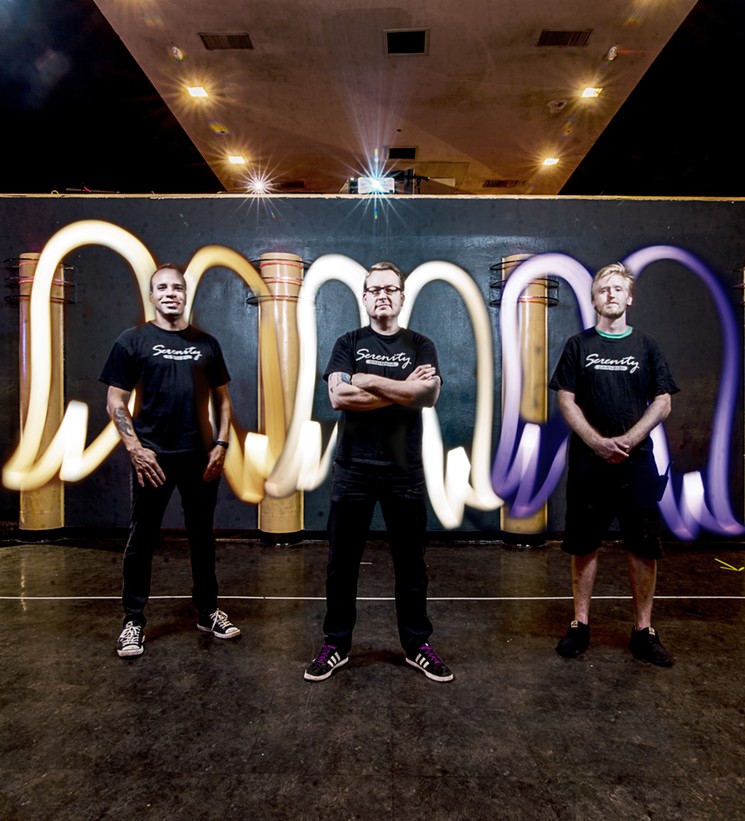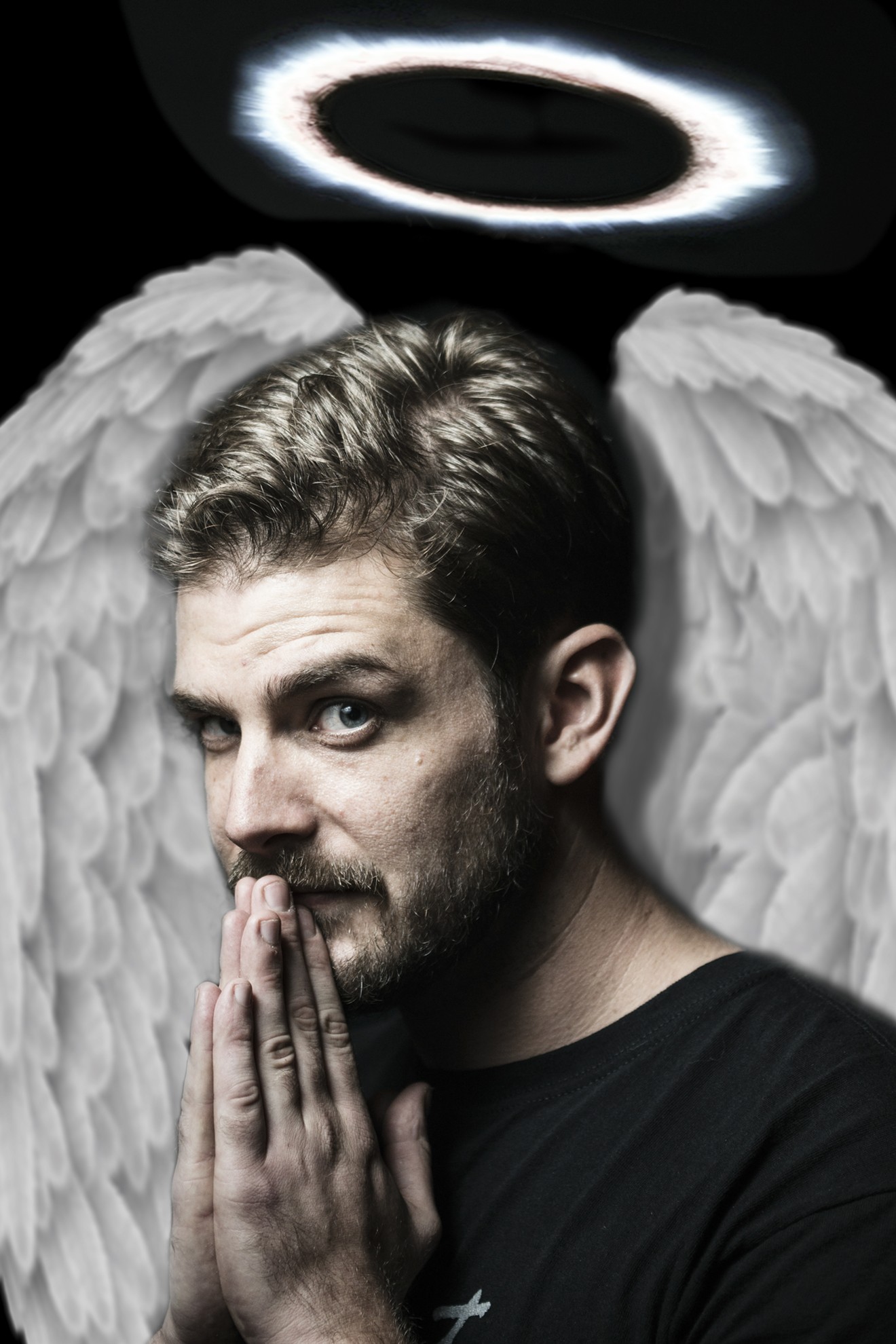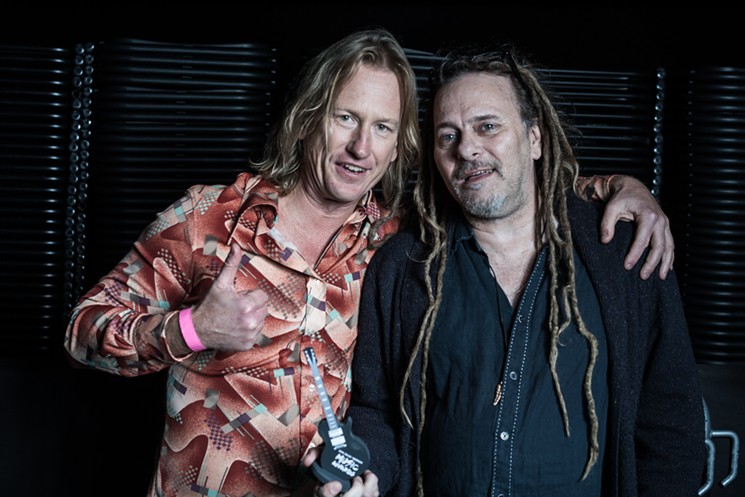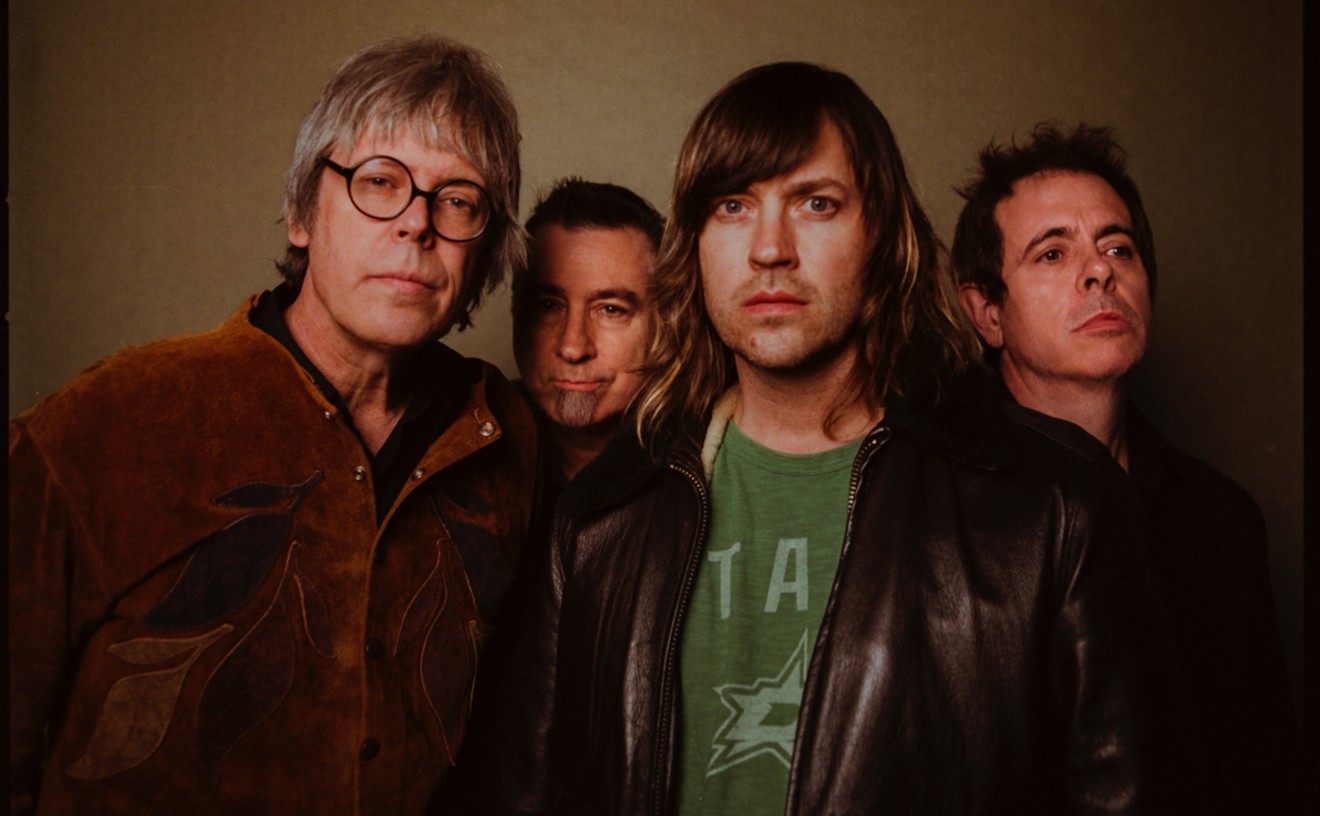“You see a lot of venue staff members with shirts that say ‘staff’ or ‘security.’ We wanted to have a couple things in the venue that stood out and said some things differently,” said Granada owner Mike Schoder, who dubbed the venue’s security Serenity. “‘Serenity’ is mostly an approach to kindness — treating people like you would if you were at a really nice resort — and kindness to oneself, not just to others,” he says.
Regular attendees have noticed.
“They’re great guys. They always make sure if you need to be walked to your car, they’ll walk you to your car,” Granada regular Christina Tran, 28, said at a recent show by Grateful Dead cover band Forgotten Space. “They’re friendly but firm. They’re out here making sure the street is separate from the crowd, but they take care of us here.”“They’re not too strict and they’re not too loose. It’s a well-run ship, the whole operation.” – Granada regular Tom Bannon
tweet this
Most remarkable is that the Granada’s perception of what it should be doing is so different from most other venues today. It continues to roll with its gentle approach even as ever-growing concerns about concert security — amplified by last year’s bombing at an Ariana Grande concert in Manchester, England, and the mass shooting at the Route 91 Harvest Fest in Las Vegas — have many other venues in Dallas implementing strict new policies.
“They’re not too strict, and they’re not too loose. It’s a well-run ship, the whole operation,” another regular, Tom Bannon, 50, said. “Sometimes a place seems to go a bit overboard, giving you the third degree on the way in. But it’s usually the larger venues. This venue is right in line with what they need to be doing.”
In a recent interview with the Observer, photographer Mike Brooks said he’s been stopped in the last year for taking pictures outside of American Airlines Center and even fidgeting with his camera in his car. The security at AT&T Stadium is armed.
“Even if you go to the Bomb Factory, they’ve got metal detectors now,” Brooks said. “It’s kind of a sign of the times that everybody’s taking [security] a little more seriously. It’s disappointing, but on the other hand, I get it, too. Nobody wants to be the next site of a massacre.”
A question by another Forgotten Space attendee, Steve Watson, 45, revealed just how inconspicuous Serenity is by comparison: “Is there security here?”

The Granada's security philosophy is printed right on the team's shirts (from left to right: Chris Mouton, Joshua Puthoff and Joe Suter).
Can Turkilymaz
The camps were in Florida in the winter and Minnesota in the summer. Sweeping floors and running sound for classes and worship services became not just Schoder’s after-school and summer jobs, but also his lifestyle. That experience informs the way he runs the Granada.
“I’ve basically been doing the same thing for 40 years, since I was 10 years old,” he said. “Rock ’n’ roll and religion are essentially the same. They bring community and people together with like interests. It’s very emotional, both of them."
When we spoke to Schoder, he was in Nashville, where he and his girlfriend of 16 years, Julia Garton, were attending the Pilgrimage Festival. Occasionally during our conversation, he hollered to Garton, asking her to fill in dates on their life's timeline.
Schoder and Garton have co-owned the Granada Theater, built in 1946, since 2004. One of their first steps was to plaster a banner with the phrase “Love Yourself” above the stage. It was made by the wife of Schoder’s cousin.
“I originally saw that the opening night of American Airlines Center. Sade played, and the opener was India Arie. She had this scrawled on a torn-up white T-shirt in black magic marker, ‘Love Yourself.’ It was awesome. It just hit me,” Schoder remembers. “People in the concert environment are very open; they’re in a happy place. We wanted to make a statement there, make people think.”
Schoder trains his employees carefully.
“We teach Serenity to treat the people coming to the Granada as if it were their family pulling up to Thanksgiving dinner. You wouldn’t wave at them from inside, you’d go out and welcome them, help them carry their suitcases in,” he continued. “That’s also how we treat the bands; it’s open arms. It’s a very welcoming community feel and approach.”“We teach Serenity to treat the people coming to the Granada as if it were their family pulling up to Thanksgiving dinner." – Granada owner Mike Schoder
tweet this
For the most part, his employees heartily embrace this code of ethics.
“We do everything we can to make sure they have the greatest experience when they get here,” said general manager James Gee, adding that many bands end or start their tours at the Granada because they like its philosophy. “It’s something Mike refers to it as a ‘music vacation.’ Basically, with money getting tighter, people are having to cut back on traveling, so they’re focusing on smaller ‘daycations’ where they go to a show and a nice dinner.”
Schoder thought long and hard about what he wanted Granada’s concept to be when he was in the process of purchasing it in 2004. The winning idea came to him while he was washing his hair.
“It’s a caring and an alertness to people’s needs,” he said. “It hit me a week or two before we opened. I remember popping out of the shower and telling Julia, ‘I got it! It’s ‘Serenity.’”
When Schoder and Garton took over the Granada, it was mostly because they lived three blocks away and one of their businesses, a CD store, was on Greenville Avenue. Schoder had been going to the Granada for a while to watch second-run movies, eat pizza and drink beer, he said, but the couple also loved the building.
“It’s not just a box. It’s just the magic of that old building, being able to preserve something that’s that old. The murals in there are original from 1946, when it was built,” Schoder said. “It’s so awesome to talk to older people who are like, ‘Yeah, my first kiss was on the balcony, you know, 70 years ago.’ When we meet random people and tell them we own the Granada, almost everyone has a story about it. It’s really cool to be a part of history.”
While Schoder ended up in the most iconic building on Greenville Avenue, the way he got started on the block was much more understated.
Originally, he moved to Dallas almost on a whim. There was a speaker at the Minnesota family camp from Christ for the Nations Institute, a Bible college in Dallas. The idea of moving here for school appealed to Schoder. He graduated from high school a year early through a self-guided schooling program. He bought a car for less than $200, and he and a buddy moved down together in 1986. Schoder went on to earn degrees in theology and music, working at the Anatole the whole time.
Then he decided he wanted to run his own music company. So Schoder started a business at the intersection of Park Lane and Greenville Avenue, reselling CDs he’d bought for $3 to $5 at pawn shops out of the trunk of his car for $7.
“I had the whole city mapped out. I’d hit 10 pawn shops and sell 100 to 200 CDs per day. It was crazy how fast it built. I was hauling 1,500 CDs in my car,” he said with a laugh. “I had a whole cataloging system.”
Schoder quickly outgrew his shop on wheels and opened a small place at Mockingbird and Greenville. A few years later, he opened CD World in Addison. Then he expanded both stores to 3,000-square-foot facilities.
“From '92 to 2000, business only went up. It was unbelievable,” Schoder said. But with the rise of streaming sites and file sharing in the new millennium, his profits fell. “Business went down every month from 2000 to 2008,” he said, and he finally closed the business.
When Schoder and Garton took over the Granada in 2004, they originally subleased it from Pat Snuffer, who had already made many upgrades to the building. They bought it from him outright in 2008.
Schoder has still put in an “obscene” amount of money in upgrades — $50,000 to $100,000 each year, he said — but they’re almost done with the major improvements after spending $70,000 on a new fire alarm with a voice-activated alert this year.
They took on the neighboring, 15-year-old restaurant six years ago and named it Sundown at the Granada. It had previously been M Street Bar, Little Havana and Mike’s Treehouse. They named it Sundown for the tiny town in Canada where Schoder’s grandmother lived and he spent a lot of time as a kid.
Sundown hosts music shows for up to 200 people, which have largely been by local acts and free. Schoder said that may change soon. “It’s hard to have art without commerce,” he said.

The Granada's approach might not work everywhere, but it works well for the theater's mix of Americana, pop and cover bands.
Can Turkilymaz
During the family meeting, Gee addresses things such as call times for upcoming shows and schedule alterations should someone need to come in late for an upcoming shift. It’s the first night the Granada is rolling out a new ticketing procedure. He tells Serenity it should make things go more smoothly. Gee also notifies the staff of other areas of the building that need special attention before guests arrive.
After the debriefings from Gee and Bennett, Serenity employees disperse like bees from a hive. They are coordinated yet independently focused on the checklist of tasks Gee has given them. It’s everything from setting up chairs inside and outside the venue to sweeping the sidewalks, prepping trashcans for the onslaught of beer cans and cleaning bathrooms, which they do both before and after each show. (Serenity sees its share of urine, vomit and feces, and team member Chris Mouton said that’s his least favorite part of the job.)
Each checklist ends with “Help your coworker if done.”
Shortly before the show begins, two guys walk up to box office tender Dave Wilson and say one of their tickets isn’t working. They are inebriated — not obnoxiously so, but it would have been easy to assume they had printed the wrong ticket or were lying and trying to get into the venue for free. Wilson throws no shade and helps them with their problem.
At the Moon Taxi concert, the crowd is mostly early 20s. It’s tame, for the most part, but a few people are having difficulty walking a straight line by the end of the evening. One drunken guy is taking armloads of beer cans to the trashcan stationed in front of former Serenity member Adam Ziegler and slam dunking them one by one into the receptacle. He’s spilling more than he’s cleaning, but Ziegler doesn’t betray a hint of annoyance." I love what we do here and the way we do it. I like being part of a family; I like feeling like I matter.” – Granada general manager James Gee
tweet this
A couple ask Mouton if he will take a picture of them. He good-naturedly obliges, not only snapping a full-body photo, but also taking a head-and-shoulders close-up without being asked. Afterward, Mouton stands back and watches the remaining stragglers. He doesn’t rush the patrons who are lingering, talking to friends or hoping to snag an autograph. He lets them “get their ya-ya’s out” after the show, as he puts it.
Despite all of the alcohol consumed and the close quarters at the sold-out house, the show ends without incident. After a little nudging from Serenity, everyone leaves in peace.
“As long as you’re kind and honest, you don’t have to figure out anything else in life,” Schoder said.
Granada’s approach might not work everywhere.
“The vibe here [at Granada] is mostly Americana, some pop shows sprinkled in and a lot of cover bands. Trees, in particular, they cater to hip-hop and metal shows, same as Bomb Factory,” said Fernando Mendoza, who left the Serenity team after two and a half years to work security at Trees because he likes the genres of music better.
“At Trees, you get a different demographic, and sometimes they get out of hand. We’re prepared to be a little more hands-on if the crowds get rowdy, especially the metal shows with the moshing,” Mendoza continued. “It starts with the door guy. He’s like the muscle of the house, a big Puerto Rican buff guy who looks like He-Man — really nice guy, though.”
Gee said it’s against Granada company policy to lay hands on anyone, and customers are rarely removed, only for violence or the threat of violence — for example, if a dispute between concertgoers escalated and someone threw a punch.
“We intervene without touching the other person. We just try to create space either verbally or with our bodies until we can talk the people down or guide them to an exit,” Serenity member Joe Suter said.
He said he’s only had to settle four altercations in his six years at the Granada. In most of those cases, he didn’t even force the troublemakers to leave; he asked them to cool off outside and invited them to return once they had.
“At Trees, I’ve seen people get hands put on them, and I was like, ‘Holy shit,’” Mendoza said. “At the Granada, it’s the opposite; somebody would get fired if they put hands on someone.”
One time, a Trees patron claimed to be in the performer’s entourage and demanded he be taken upstairs to the green room.
“They put him in a full nelson and dragged him down the stairs because he was putting up a fight. He ripped off a rail from the stairwell, and when they got him outside, he had a knot on his head,” Mendoza recalled. “It was mostly from him resisting, and there was no need to resist. He was just not taking ‘no’ for an answer and not going out without a fight.”

Serenity members are instructed to stand with their arms uncrossed, so as not to be an intimidating presence.
Can Turkilymaz
Mouton has been there for eight. He said in addition to getting to watch incredible shows for free, his coworkers are his favorite part of the job.
“We all hang out a lot. Mike is very careful who he hired; we all get along well. We’re not like typical meathead security,” Mouton said as guests arrived, pausing in between checking IDs and banding people’s wrists. “Plus, we all share something special by working here. I play in a band, and I’ve discovered so much great music here.”
Gee said Schoder takes the entire staff to Fraternal Order of Eagles for Memorial Day, Fourth of July and Labor Day. He’ll rent out a party bus and pay for all the staff to go to a festival or sporting event. If anyone has a birthday or is playing a gig with his band, the whole staff comes out to support.
“They know for a fact that they can count on at least 25 people showing up,” Gee said. “We all support each other across the board on everything.”
Gee, who always goes by his last name (his email reads, “Just Gee”) has been with the Granada for 12 years. He’s about 5-foot-11, built like a lean bulldog, and bald with a neatly kept white beard. He looks to be in his late 50s.
Gee’s first position at the Granada was on Serenity. He was in sales and management for NBC, CBS and Harley Davidson when he first applied. He was burnt out on the corporate world, he said, and he applied to the Granada consistently for a year before he was hired.
After a year on Serenity, he was promoted to backstage manager, a role he stayed in for six years. He was venue manager for another five years and was promoted to general manager last year.
Gee said he’s turned down offers from big corporate venues.
“It doesn’t appeal to me. I don’t like the way they do their business," he said. "I love what we do here and the way we do it. I like being part of a family; I like feeling like I matter.”
Schoder has been thinking recently of expanding Serenity’s responsibilities. In an effort to fill the gap between the 200-capacity shows at Sundown and the 1,000-capacity shows at the Granada, he’s come up with the idea of “SerenityPresents,” a promotion company that hosts shows at other venues like Club Dada, which has a capacity of 500.
He’s encouraged by the feedback he gets online. “People post on Yelp, ‘The staff there was cool,’” Schoder said. “It’s as simple as that, really.”













